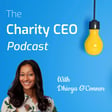
Ep 51. Eliza Reid, Former First Lady of Iceland and writer: Championing Gender Equality
“Gender equality is a choice… working for greater gender equality is not a zero sum game, where you’re taking something from one group and giving it to another - it’s helping to level the playing field for everyone.”
Special guest, Eliza Reid, is a bestselling writer, public speaker, gender equality advocate, entrepreneur and former First Lady of Iceland. Iceland has topped the World Economic Forum’s gender equality rankings for 15 years, as the country with the smallest gender gap. In her first book, Secrets of the Sprakkar: Iceland’s Extraordinary Women and How They are Changing the World, Eliza examines what it is about Iceland and Icelandic society that makes it the most gender-equal country in the world.
We talk about Eliza’s own extraordinary journey from growing up on a farm outside of Ottawa in Canada, to becoming the First Lady of Iceland, and what she has learnt along the way. It is a fascinating account, showcasing Eliza’s determination to go beyond the traditional expectations of her role as First Lady, make the most of unexpected opportunities, and to use her unique voice and privilege to advocate for gender equality and social justice.
Recorded December 2024.
Guest Biography
Eliza Reid is a bestselling writer, public speaker, gender equality advocate, co-founder of the acclaimed Iceland Writers Retreat and former First Lady of Iceland. She was born and raised in Canada but has lived in Iceland for over twenty years. Eliza’s first book, Secrets of the Sprakkar: Iceland’s Extraordinary Women and How They Are Changing the World, was an instant bestseller in Canada and Iceland, a New York Times Book Review Editors’ Pick, and translated into numerous languages. Her first novel, an Iceland-set mystery called Death of a Diplomat (Death on the Island in the U.S.), will be published in spring 2025. From 2016 to 2024, Eliza served in the unofficial role of First Lady, while her husband was President of Iceland, during which time she served as patron of numerous organisations, and was named a United Nations Special Ambassador for Tourism and the Sustainable Development Goals. Passionate about inclusion, belonging, and equality, she wielded her influence through poignant op-eds, a compelling TEDx talk, and dozens of keynote addresses to audiences around the world, including presidents and royalty. Eliza has degrees from the University of Toronto (Trinity College) and Oxford University (St. Antony’s College). She lives in the outskirts of Reykjavík with her husband and four children.
Links https://elizareid.com/

